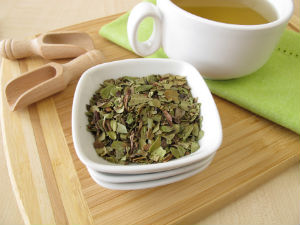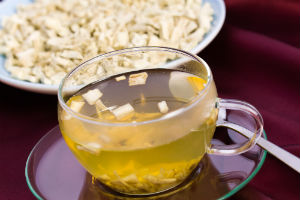4 Must-Know Facts About Goldenrod and Kidney Health |  |
- 4 Must-Know Facts About Goldenrod and Kidney Health
- Uva Ursi: 6 Facts to Know
- Marshmallow Root and Kidney Health: 4 Facts to Know
- 5 Unhealthy Ingredients To Avoid During Pregnancy
| 4 Must-Know Facts About Goldenrod and Kidney Health Posted: 19 Sep 2014 01:21 PM PDT  Goldenrod, or solidago, is a plant used as a traditional approach to diabetes, gout, and arthritis. It is also used as a mouth rinse to reduce discomfort and swelling in the mouth and throat. While folk medicine regards it as a natural approach for supporting the body against a wide range of issues, its ability to aid and soothe the urinary tract is more than folklore. In fact, modern science supports its use as a protector of urinary tract and kidney health.
1. Flushes Your SystemGoldenrod has diuretic properties that help to release excess water from your body by increasing urine flow through the kidneys and bladder. This irrigates the kidneys and helps to remove renal deposits which otherwise might develop into kidney stones. It also supports the overall health of the kidneys and urinary tract by helping to remove harmful organisms which might cause harm. [1] 2. Soothes and ProtectsGoldenrod is a soothing and toning agent for the urinary tract. Lab and human studies have reported on its ability to reduce swelling. [2] When discomfort and swelling are lessened, tissue is more tone and, in the case of the urinary tract, the path is more smooth. This allows for an easier release of mineral buildups which could otherwise lead to kidney or bladder stones. 3. Supports Urinary Tract HealthThe diuretic effect of goldenrod, when combined with other approaches to managing UTIs, have shown to be effective for preventing recurrent UTIs than individual approaches alone. One study looked at goldenrod as a complementary approach to traditional antibiotic therapy. Those participants taking both the goldenrod and the antibiotic enjoyed the fewest recurrences of UTIs compared with participants in other groups. [3] 4. Has Few to No Side-EffectsNo studies that have evaluated goldenrod as a therapy for the urinary tract have reported negative side effects. Herbal remedies like this can offer a better quality of life than other medical options since it achieves the desired goal without the unpleasantness of unwanted side effects. One Final Thought?The Native Americans used goldenrod to strengthen and support urinary function. Some recent research suggests goldenrod is more an aquaretic than a diuretic, meaning it increases water release without the loss of electrolytes. Either way, it has a long history of success protecting the health of the urinary tract and we can only expect to see future positive studies coming out on its benefits for the entire body. Have you used goldenrod before? Please leave a comment and share your experience with us! -Dr. Edward F. Group III, DC, ND, DACBN, DCBCN, DABFM References:
The post 4 Must-Know Facts About Goldenrod and Kidney Health appeared first on Natural Health & Organic Living Blog. |
| Posted: 19 Sep 2014 01:10 PM PDT  The leaves of bearberry, or uva ursi as it is often called, have played an important role in kidney and urinary health around the globe for centuries. It remained a common approach to UTIs and kidney stones until the recent advent of antibiotics. The overuse of antibiotic therapy, however, has resulted in numerous antibiotic-resistant bacteria issues. Fortunately, plant-based approaches continue to prove effective against harmful organisms. Here's 6 facts you should know about how uva ursi may support kidney and urinary tract health.
1. Soothes Urinary and Bladder TissueMineral deposits, germs, and toxins inflame and irritate the mucous membranes of the urinary tract and bladder. Arbutin, an active compound in uva ursi, neutralizes unwanted organisms and acts as a powerful agent for the soothing of mucous membranes and the reduction of tissue inflammation. [1] With increased concern over the effectiveness of antibiotics, researchers have determined uva ursi is a viable option for fighting infection, preventing UTIs and supporting bladder, urinary tract, and kidney health. [2] 2. Promotes Wound HealingIrritated and inflamed mucous membranes can suffer tiny cuts from crystallized minerals and toxins. Allantoin, another compound in uva ursi, encourages wound healing in affected tissues. The healthier the tissue, the easier for urine to pass and carry away wastes and other buildup. 3. Lowers AcidityHighly-acidic urine encourages stone formation in the kidney and bladder. Tannins in the leaves of uva ursi lowers the acidity of urine, aiding in the prevention of the crystallization that leads to stones. 4. Cleanses KidneysRemember arbutin? This natural compound found in uva ursi passes into the blood largely unchanged and has a diuretic effect, encouraging the urge to urinate. As it passes through the kidneys, it exercises an antiseptic effect by clearing away harmful organisms. Its astringent properties may help reduce irritation and may also encourage deposits to pass out of the kidneys. 5. Reduces Uric Acid BuildupUric acid poses a health danger to the kidneys, bladder, and joints throughout the body by increasing the risk for stone formation. Uric acid build up in the joints can also cause arthritic conditions. The anti-lithic properties of uva ursi keep the kidneys and bladder free from crystallization and have made it useful in some approaches to arthritis. 6. It's SafeSome sources suggest too much uva ursi may be dangerous to the liver. Of course, the same could be said for all food, healthy or otherwise. While one chemical known for liver toxicity is present, researchers have evaluated uva ursi at recommended dosages and found it to be safe. [3] If you're interested in taking uva ursi and have certain liver conditions, it may be wise to discuss your options with your doctor. One Final ThoughtFor centuries, uva ursi has been an integral part of traditional folk healing. It continues to provide an excellent non-pharmaceutical approach to bladder, kidney, and urinary tract health. Not only that, it has also been known to amplify the effects of conventional approaches to healing. Check with your doctor or healthcare practitioner prior to taking uva ursi to ensure it doesn’t conflict with current medications. Have you taken uva ursi? Share your experience and let us know how it worked for you! -Dr. Edward F. Group III, DC, ND, DACBN, DCBCN, DABFM References:
The post Uva Ursi: 6 Facts to Know appeared first on Natural Health & Organic Living Blog. |
| Marshmallow Root and Kidney Health: 4 Facts to Know Posted: 19 Sep 2014 12:55 PM PDT  When it comes to protecting the body, a discussion involving the best ways of keeping the heart, brain, and digestive tract strong is almost always brought up. The urinary tract — which includes the kidneys and bladder — carries a heavy burden when it comes to removing many of the body's toxins. When the urinary tract is under a great deal of stress, toxins can build up and damage organs. Mallow root, commonly called marshmallow as a reference to the marshes it’s typically grown in, has been used since ancient times to soothe sore throats and soften skin. Here are 4 reasons to use marshmallow root for supporting urinary tract health.
1. May Reduce Irritation and Support Smooth TissueIn the same way marshmallow soothes sore throats, marshmallow appears to ease swelling in mucus membranes that line the colon and the urinary tract. [1] This swelling of the urinary tract makes tissues more sensitive and prone to damage from passing sediment. It also increases the potential damage from toxins carried by the urine. 2. Increases Urine FlowMarshmallow possesses diuretic properties which encourage increased urine flow. This helps the body flush the kidneys and bladder, in turn reducing the buildup of minerals and toxins. Natural diuretics may also help reduce water retention, a common bloating issue that affects many people, particularly women. 3. Fights InfectionRecent studies have reported that marshmallow exhibits fighting actions against unfriendly organisms. The studies performed so far have focused on its traditional use in the mouth and throat and its effect on harmful organisms typical to those areas. [2] This makes marshmallow root a potential fighter against bacteria associated with gum disease and strep throat. While studies are warranted on its potential for fighting against a wider range of harmful organisms, its success fighting infection validates its use as a powerful and supportive urinary tract supplement. 4. Encourages Healing TissueMedicinal herbs like marshmallow often possess antioxidant properties in addition to the curative properties attributed to tradition. Marshmallow has been identified as having one of the highest levels of glucuronoxylan, a potent antioxidant. [3] Antioxidants like glucuronoxylan protect cells from free radical damage, promoting health along the urinary tract and throughout the entire body. One Final ThoughtMarshmallow provides a wide range of benefits for many areas of the body, not just for the urinary tract. Its potential for combating infection may prove beneficial in future experiments. For occasional bouts with bloating, marshmallow root may also help individuals find relief without having to reach for over-the-counter chemical diuretics. For soothing and promoting urinary tract health, speak with your doctor about this powerful herb. Have you used marshmallow root? Please share your experiences and let us know how it worked for you. -Dr. Edward F. Group III, DC, ND, DACBN, DCBCN, DABFM References:
The post Marshmallow Root and Kidney Health: 4 Facts to Know appeared first on Natural Health & Organic Living Blog. |
| 5 Unhealthy Ingredients To Avoid During Pregnancy Posted: 19 Sep 2014 08:00 AM PDT  If you’re pregnant, you want to assure that your developing child is receiving only the very best. One way to do this is to consume as much natural, plant-based foods as possible. Unfortunately, there are many different theories about what foods constitute a good diet. It may be simpler to understand what to avoid while pregnant. Use this post as a guidance system for creating your own diet for you and your baby.
Agribusiness has separated us from the sources of our food and has adulterated it so that what our grandparents consumed bears little resemblance to what most people eat today. A huge number of ingredients in today’s foods weren’t even in existence a few years or decades ago. Consider artificial sweeteners, like acesulfame potassium, aspartame, and saccharin. Many of these ingredients are hidden under generic terms and can be consumed very easily if you aren't paying close attention to what you're eating. What Should You Look Out For?A diet based on unnatural substances or processed foods is probably best to avoid at all costs. To keep it simple, stay away from any prepared, processed foods. This means you should avoid virtually all the stuff that supermarkets sell as food and stick with real foods from organic farms. You can also simply shop around the perimeter of your grocery store, sticking to produce sections, bulk bins, and the dairy and meat cases. This shouldn't be applied just to women who are pregnant, however, as everyone benefits from choosing natural, whole foods. 1. Artificial SweetenersAspartame is potentially devastating to a fetus, not to mention the mother. One study has documented that the offspring of rodents suffer far more cancer of the liver and lungs when their mothers are fed aspartame. [1] Aspartame is also an excitotoxin, meaning it excites neurons to the point of death. It’s a neurotoxin that’s been shown to compromise learning and emotional function, critical elements for maintaining a high quality of life. [2] Aspartame is metabolized into formaldehyde, a poison that binds to bodily tissues. [3] Do you really want this happening when carrying a baby inside of your body? Neotame is similar to aspartame but stronger in both sweetness and toxicity. The FDA, of course, claims that it’s safe. Despite FDA's leanings, a review in the journal Regulatory Toxicology and Pharmacology documented that those studies have inappropriate endpoints. Therefore, the truth is that neotame has never been shown to be safe. [4] 2. SugarWhen it comes to sweeteners, you should use only natural alternatives. The safest natural sweetener out there is stevia, and then only if it’s in its truly natural form. That is, use stevia only if it’s in the form of the natural leaf, the dried powdered leaf, or an extract. Keep your use of real sugar to a minimum as it results in consistent blood sugar and insulin spikes that can, over time, lead to diabetes and predispose your infant to the same thing. Other natural sugars, such as agave and corn syrup, should be limited completely because they contain a high level of fructose, a monosaccharide which is harmful to the liver. [5] Honey is a bit more complex. As a rule, it’s an excellent sweetener which may provide significant health benefits as long as it’s eaten in its raw form. The downside is that honey’s sweetness is due to fructose and glucose. Therefore, too much can have some harmful effects, especially for individuals with insulin insensitivity issues. So go ahead and enjoy some raw honey, but do so in moderation. Organic maple syrup is also a viable option, containing a great deal of antioxidants. In spite of the benefits, maple syrup is still a sugar, making it advisable to take only in small amounts. 3. Genetically Modified FoodsIt may be wise to avoid any and all genetically-modified (GM) foods when pregnant. Genetically-modified foods are foods that have been produced in a lab through the insertion of genetic changes within the DNA. This is often done to improve the hardiness of a crop against the elements and harmful insects. While the idea is a noble one, its effects on human health have been consistently shrouded in controversy. [6] [7] Although they certainly aren’t healthy any other time, during pregnancy they can be disastrous. Most of the offspring of rats fed Roundup Ready soy died before they were three weeks of age. Very little of what is consumed is blocked by the placenta, therefore you must assume that any food that can produce effects in the mother can also happen in the fetus. Avoiding GM foods can be difficult, but the task is not impossible. Anyone in the United States should avoid all foods from most restaurants. Nearly all prepared foods from supermarkets contain GM ingredients if not organic. The only sure way to avoid GM meat, vegetables, or fruits is to choose only organic. Even if a particular crop isn’t genetically engineered yet, the odds are high that it will be soon. The Non-GMO Shopping Guide can help you refine your search for non-GM foods. 4. Prepared FoodsFoods that have been processed before you purchase them are nearly always questionable when it comes to health. Aside from the fact that they usually contain genetically engineered foods, they are nutritionally deficient because most of what’s in them consists of processed grains and labratory-produced chemicals, not real food. Therefore, you should avoid most products sold by supermarkets and virtually all foods from fast food outlets and most restaurants. 5. Herbicides and PesticidesPesticides and herbicides used in modern farming are poisons. Their main, sole purpose is to kill. The National Pesticide Information Center’s website page starts with the sentence, “All pesticides have some level of toxicity and pose some risk during pregnancy.” Notice that they didn’t state that “most” pesticides are toxic and risky during pregnancy. They stated that ALL of them carry a threat. Therefore, you need to be sure that even fresh foods are free of pesticides. How can you do that? There is only one reasonably sure-fire way: eat only organic foods. All other foods will almost surely have been treated with pesticides or herbicides while they were growing. You cannot expect to remove pesticides simply by washing, as some pesticides can latch onto a plant and resist methods of water-based removal. The Take HomeAs an expectant mother, you have the final say as to what you decide to eat. All mothers know intuitively that they need to consume a healthy diet in order to produce a healthy child, yet many can find it difficult to adhere to a strict meal plan that doesn't include their favorite craved foods. While it may be OK to have a treat every now and then, it's also wise to balance this with a hefty amount of raw vegetables, nuts, seeds, and other plant-based foods in order to offer the much-needed protection you and your child requires. What are or were your experiences eating a healthy diet while pregnant? Do you feel a difference when eating an organic meal plan during pregnancy versus eating a processed-food diet? Please let us know your experiences in the comments! -Dr. Edward F. Group III, DC, ND, DACBN, DCBCN, DABFM References:
The post 5 Unhealthy Ingredients To Avoid During Pregnancy appeared first on Natural Health & Organic Living Blog. |
| You are subscribed to email updates from Natural Health & Organic Living Blog To stop receiving these emails, you may unsubscribe now. | Email delivery powered by Google |
| Google Inc., 20 West Kinzie, Chicago IL USA 60610 | |
No comments:
Post a Comment